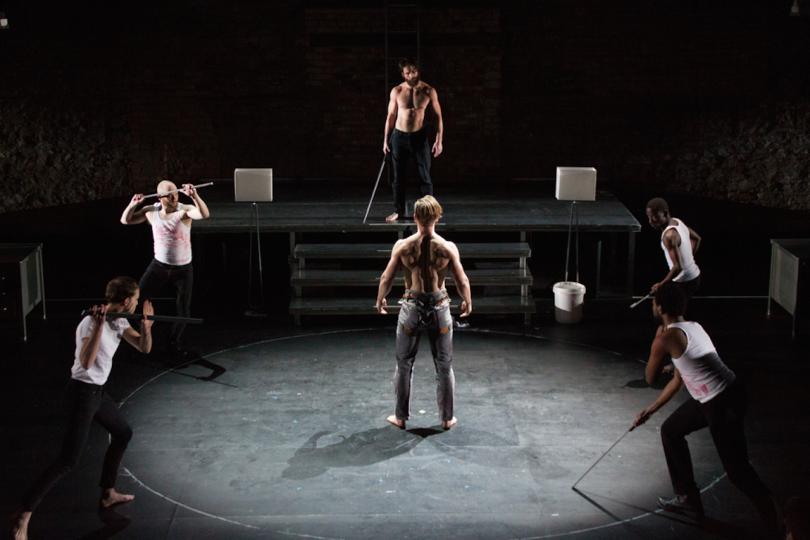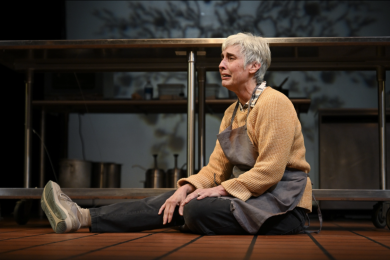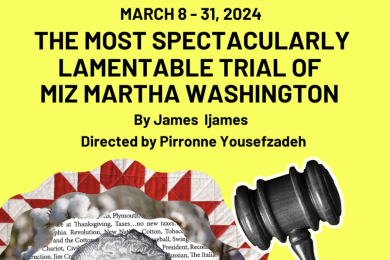These men

The New Epic Theater and its director Joseph Stodola have been getting a lot of press recently, including a profile in MinnesotaPlaylist, for their innovative, Brecht-inspired productions. The company is aiming high – high enough to produce Larry Kramer’s The Normal Heart in repertory with Shakespeare’s Coriolanus. Both are meaty, challenging plays that could easily stand alone. Doing both was a ballsy move that has attracted attention. The question is: does it work?
On the surface, a play about the AIDS crisis doesn’t have much in common with a tragedy about a prideful Roman general. But Stodola makes the case that both plays deal with the relationship between humans and society, the process of marginalization, and resistance to authority. I haven’t had the chance to see The Normal Heart, so I can’t speak to the success of the Normal Heart/Coriolanus pairing. But I do have thoughts about Coriolanus on its own, because while Stodola’s chosen themes are apt for the play, the production doesn’t successfully get them across.
Coriolanus is one of Shakespeare's least produced plays, probably because of both its dense political themes and the fact that one of Coriolanus’s main character traits is his inability to connect with the common people. Given that the play is challenging and unfamiliar to begin with, it seems particularly important for the performers to bring the play to life through close attention to the poetry and shape of the text. The dynamic staging of the New Epic production – which I’ll return to later – made the broader plot points clear, but its line readings failed to draw me in. Some of the lines came across as conversational when they should have been declamatory and vice-versa, and the muddled interpretations made it hard for me to parse the play’s thematic content.
A Platonic ideal of maleness?
But although issues of authority and marginalization are unclear, the production is fully invested in one theme that Stodola doesn’t mention in his program note: masculinity. A kind of Platonic ideal of maleness starts to take shape before the play even begins, when Torsten Johnson, as Coriolanus, comes out in a white tank top and jeans, muscles bulging, to draw out a large circle in white chalk around the center of the stage. The stark, Fight Club-style aesthetic makes it clear that this ring will be the site of an important future combat and that proven physical prowess will central to the production.
It turns out that although Coriolanus’s physique (as well as that of his arch-enemy Aufidius, played by Michael Wieser) is certainly impressive, it’s just the tip of the iceberg. As I watched the play, I listed the attributes that were clearly displayed as indicators of the actors’ masculine power: not only their chiseled bodies, but also their slicked hair, full beards, ability to rappel off a ladder, desire to rub blood all over their torso and face (whose blood? doesn’t matter), and utter inability to keep a shirt on for more than ten minutes. Coriolanus and Aufidius exhibit all of these characteristics, while Titus and Brutus, the balding and bespectacled plebeian politicians, are both less fit and played as more effeminate.
It also felt clear to me that I, a heterosexual woman, was not the intended audience for this portrayal of masculinity. Rather than objectifying men for a straight female gaze, Coriolanus’s form of objectification seemed more aspirational and intended for men, like a CrossFit video or a mixed martial arts showcase. In fact, there are some beautifully-choreographed fight scenes where Johnson, Wieser, and a couple of other cast members pull off moves that require some real training and muscle power. But each time a shirt was whipped off in order to spread on another layer of fake blood, I felt more and more confused by the pageantry of the whole thing – and that made the production more amusing than heart-pounding, which I’m fairly sure was not the director’s intended effect.
Soon after intermission, my amusement only grew when I realized that the lighting designer, Lucid Thomas, had arranged the side lights to accentuate the shadows between the actors’ pecs and back muscles, making them look even more toned.
To what end?
I was obviously distracted by the production's physicality, but this was largely because, as I mentioned earlier, the actors' line readings weren't nuanced enough to give me anything else to think about. Still, as I left the theater, I puzzled over whether the emphasis on brutal maleness was an intentional statement about the masculine ideal and how it can lead men into impossible situations. Given the play’s pairing with The Normal Heart (about the gay community in the 1980s), focusing on masculinity in Coriolanus could create an interesting counterpoint for considering gender norms. But while the production clearly made visual and conceptual choices, I couldn’t figure out how the parts added up to a thematic whole.
For instance, Aufidius has an intensely homoerotic scene with Coriolanus. There’s evidence for it in one monologue, but the sexual charge between the two men seems unsupported in the rest of the play, at least to the degree that it appears here. There was also an odd costuming choice in a scene where Coriolanus is hesitant to show off his battle scars to the general public. He finally appears in a hospital gown which, ironically, is actually less revealing than the outfit he wears for a good chunk of the play (jeans and no shirt). If the production is aiming to comment on male relationships or male bodies, then choices like these just muddy the waters.
One breath of fresh air amidst the clouds of musk was Michelle O’Neill in the role of Volumnia, Coriolanus’s mother. Volumnia gets relatively little stage time, but she plays an important role in the plot, and O’Neill brings her to life in an effective and moving way. There is a tribute to mother-son relationships hidden in there, if you take a moment to look for it.
I also have to pause to consider the mission of New Epic Theater itself, which is inspired by Brecht. Is it possible that my difficulty engaging with the play was a deliberate choice by the theater company? It’s true that Brechtian theater is very interested in putting on a spectacle that alienates its audience from any sense of identification with the characters, a phenomenon which definitely occurred for me during the show. And yet I can't shake the feeling that this testosterone-fueled sense of alienation wasn't intentional – or if it was, to what end?




